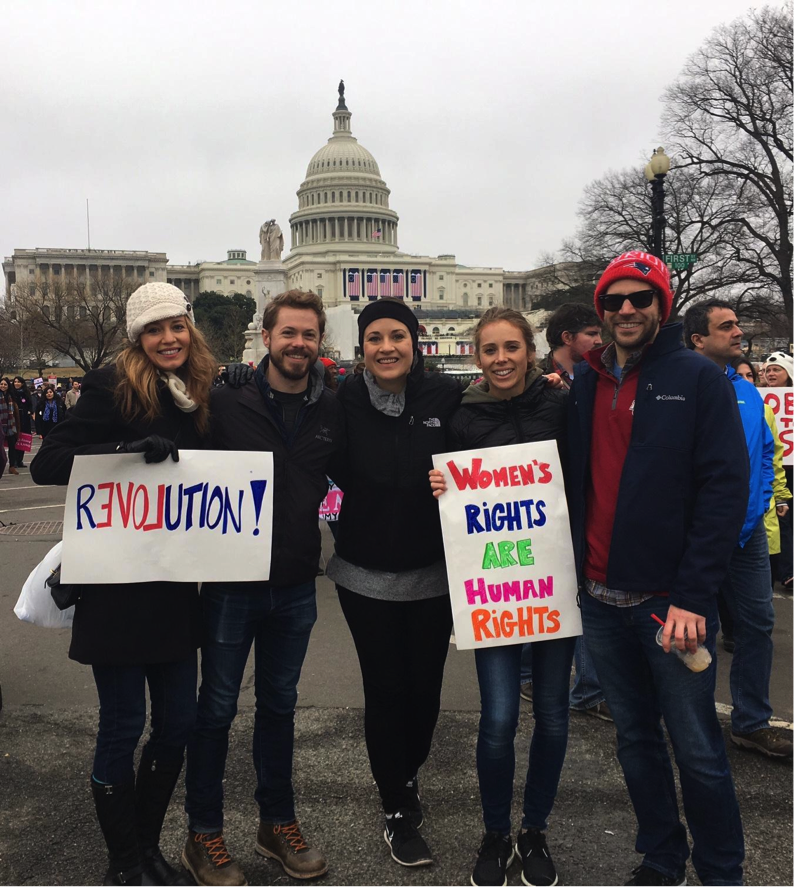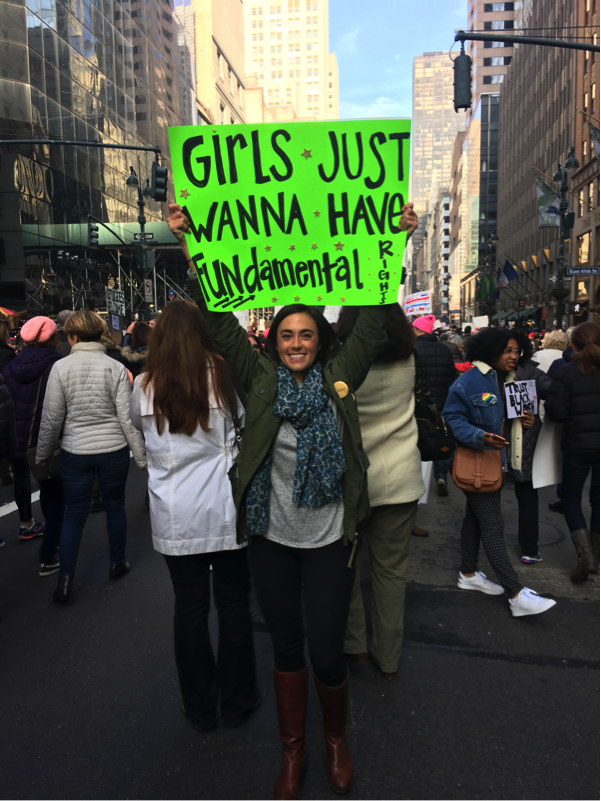“We stand together in solidarity with our partners and children for the protection of our rights, our safety, our health, and our families – recognizing that our vibrant and diverse communities are the strength of our country.” – Women’s March mission statement
On January 21, more than 5 million people marched peacefully across the globe to shed light on inroads made against gender inequality. I joined the march in Washington, DC along with 500,000 other women and allies. We stood for what we believed in, to protect our rights and the rights of others.

So why did I march?
I marched to show solidarity. I have privilege that others do not: I am a white, straight, well-educated woman who enjoyed an upper middle class upbringing. I don’t know what it’s like to not have health insurance. I don’t know what it’s like to struggle to work and raise a family on my own. I don’t know what it’s like to face racial discrimination. But I do know what it’s like being a woman in America. I have been sexually harassed, been taken less seriously than my male colleagues, and have heard lewd comments about me as I’m walking to work in the morning. I have listened to multiple friends tell me they were raped but were too afraid to report it.
The most eloquent summary of why I marched came from Michelle Obama’s July 25, 2016 Democratic National Convention speech:
“It’s like that sick, sinking feeling you get when you’re walking down the street minding your own business and some guy yells out vulgar words about your body, or when you see that guy at work that stands just a little too close, stares a little too long so you feel uncomfortable in your own skin. It’s that feeling of terror and violation that too many women have felt when someone has grabbed them, or forced himself on them and they’ve said no but he didn’t listen — something that we know happens on college campuses and countless other places every single day. It reminds us of stories we heard from our mothers and grandmothers about how, back in their day, the boss could say and do whatever he pleased to the women in the office, and even though they worked so hard, jumped over every hurdle to prove themselves, it was never enough.
We’re trying to keep our heads above water, just trying to get through it, trying to pretend like this doesn’t really bother us maybe because we think that admitting how much it hurts makes us as women look weak. Maybe we’re afraid to be that vulnerable. Maybe we’ve grown accustomed to swallowing these emotions and staying quiet, because we’ve seen that people often won’t take our word over his. Or maybe we don’t want to believe that there are still people out there who think so little of us as women. Too many are treating this as just another day’s headline, as if our outrage is overblown or unwarranted, as if this is normal, just politics as usual.”
Lastly, I marched for the women in my life. On a recent family visit, my 5 year old niece and I were studying the U.S. presidents. I told her “Maybe you could become president one day!” She looked at me and responded, “Only boys can be president.” It broke my heart.
It matters that women have a voice and that we have representation in government. Young girls need strong leaders to look up to. There is evidence to suggest that the “role model effect” can influence the lives of young girls. In her research on local governments in India, MIT economist Esther Duflo concluded that having long-standing female politicians in government significantly increased the ambitions of young girls. In cities that lacked female leadership, young girls were around 30% less likely to aspire to secondary school. When we have women leadership and positive role models, the gender gap narrows, and that benefits any society. I want to be that leader for the young girls in my family.
What Others Had to Say:
I asked a few readers to contribute their experiences from different marches. Here’s what they had to say:
“Nothing can compare to the experience of marching alongside hundreds of thousands of people – young and old, men and women, LGBTQ, black, white, Asian, Muslim, Jewish, Christian, and everything in between. I marched the New York City streets yesterday for many reasons and to make my voice heard. I marched to support women’s rights and the choice for us to do what we want to our bodies – for freedom of choice. I marched to support equality. And not just gender equality, but racial and religious equality, equality for one’s own beliefs, as every human being deserves compassion and respect, something he has proven he doesn’t support. Most importantly, I marched to support those around me and for our future.”
– Natalie Gerke @nataliegerke New York City

“Not marching was not an option. My generation has been rather comfortable, taking the active out of activism. Every personal tenet of mine and of many people I care about has been minimized or threatened by the election of the current administration. We have the right to assemble and the right to speak up for what we feel is moving backward, and that is why I marched.
Rin Ehlers, Travel Women Ambassador @rinehlers San Diego
“I marched for the people who don’t enjoy the privilege I enjoy. As a middle-class, white, well-educated, heterosexual woman, who has been lucky enough to live where I want, travel where I want, go to the doctors I want, I understand the way privilege has informed every aspect of my incredible life. I marched for my Muslim, Mexican, and LGBTQ students; for my daughter’s future and for my husband, who does not enjoy white privilege, and his safety in the world.”
Suzanna Caines @suzanneinthecity New York City
“For my mom, for my niece and all of the children in this country, for everyone who is afraid right now, for all the people of the US – even those that disagree or don’t understand, we need to start a dialogue. I am so inspired…”
Erin @trainsplanesvino
What’s Next?
If you felt inspired by the march, channel that energy! Here are some suggestions of ways to keep the fire alive:
● The Women’s March has released the 10 Actions/100 Days. Sign up on https://www.womensmarch.com to learn how to stay involved.
● Contact your member of Congress to voice your opinions. Don’t know how? Start here: http://www.house.gov/representatives/find/
● Read! Support quality journalism. Get the facts first. Find out what’s at stake so you can make your voices heard.
● Volunteer for causes and organizations you care about.
